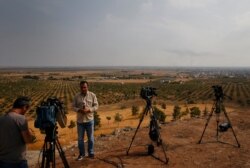Members of Turkey's largest journalism trade union rallied outside Ankara's Communications Directorate on Monday to protest the government's mass cancellation of state-issued press credentials.
According to the Journalist’s Union of Turkey, known by its Turkish acronym TGS, and international press advocacy groups, such as the International Federation of Journalists (IFJ), up to 1,400 press cards have been canceled in recent months.
Most of the journalists targeted for cancellation, observers say, report for independent news outlets or publications critical of the government of Turkish President Recep Tayyip Erdogan.
Although journalists are permitted to work without press cards, the passes are the only documents that allow reporters to access Parliament and other government buildings.
"As journalists, we don't need permission from anyone," Esra Koçak, Ankara-branch chairman of TGS, told independent Turkish news agency Bianet. "We want to protect people's right to receive information, which is our only motto."
Indefinite review
In 2019, Turkish communications officials announced plans to change the traditionally yellow press card to turquoise and require all reporters to submit applications for the new cards no later than Jan. 26, 2020.
Since that announcement was made, hundreds of applications for renewal have remained under indefinite review without explanation, and journalists left in bureaucratic limbo have been instructed to await a ruling on the status of their individual applications.
Although some reporters were told they could continue using their old yellow cards in the meantime, Ankara officials invalidated all yellow cards on the Jan. 26 deadline.
Officials with Turkey's Communications Directorate did not respond to requests for comment, but the agency's director, Fahrettin Altun, took to Twitter Monday to deny allegations of mass decredentialing.
"Reports regarding the cancellation of press passes is not accurate,” he wrote, appending a diagram showing several phases of the press card application process.
Turkish communications officials, he wrote in further posts, must first determine whether applicants are “professionally engaged in journalistic activity, whether he/she is affiliated with a terrorist organization and whether he/she has been engaged in any action or conduct that tarnishes the integrity of the profession.”
Altun put the number of the unconcluded applications at 894.
Some cards reactivated
After several hours of protests on Monday, some journalists found that their cards were at least partially reactivated, suddenly indicating a "still in use" status on government web portals, leading some to questions whether the government had begun walking back the restrictions.
"It appears that the Directorate decided to correct the mistake," said a TGS spokesperson. "We call on the officials to issue the new press passes that have been put on hold for the past year with no reason provided.”
Ankara's Communications Directorate has reported to President Erdogan’s office since June 2018, when Turkey scrapped its parliamentary system for an executive presidential system of governance.
According to the New York-based Committee to Protect Journalists, 15 reporters and the top editor of Istanbul-based Evrensel have been denied reporting credentials, as have journalists working for other left-leaning dailies such as BirGün and Cumhuriyet.
"Turkey's decision to cancel the press cards for hundreds of journalists is yet another attack on independent reporting and is absolutely unacceptable," said Gulnoza Said, CPJ's Europe and Central Asia program coordinator, in New York. "Authorities should immediately restore the journalists' press credentials, and should ensure that passes are granted in an impartial process.”
Paris-based Reporters Without Borders, known by its French acronym RSF, ranked Turkey 157 out of 180 countries in its 2019 annual World Press Freedom Index.
"After the elimination of dozens of media outlets and the acquisition of Turkey’s biggest media group by a pro-government conglomerate, the authorities are tightening the vice on what little is left of pluralism – a handful of media outlets that are being harassed and marginalized," said the RSF report, which identifies Ankara as the world's second largest jailer of journalists.
The 2019 RSF index ranked the United States 48 out of 180, a three-slot drop from 45th place in 2018, as "rhetorical attacks from the government and private individuals alike grew increasingly hostile."
CPJ reported that Turkey revoked press credentials of some 900 journalists after the attempted coup in 2016.






